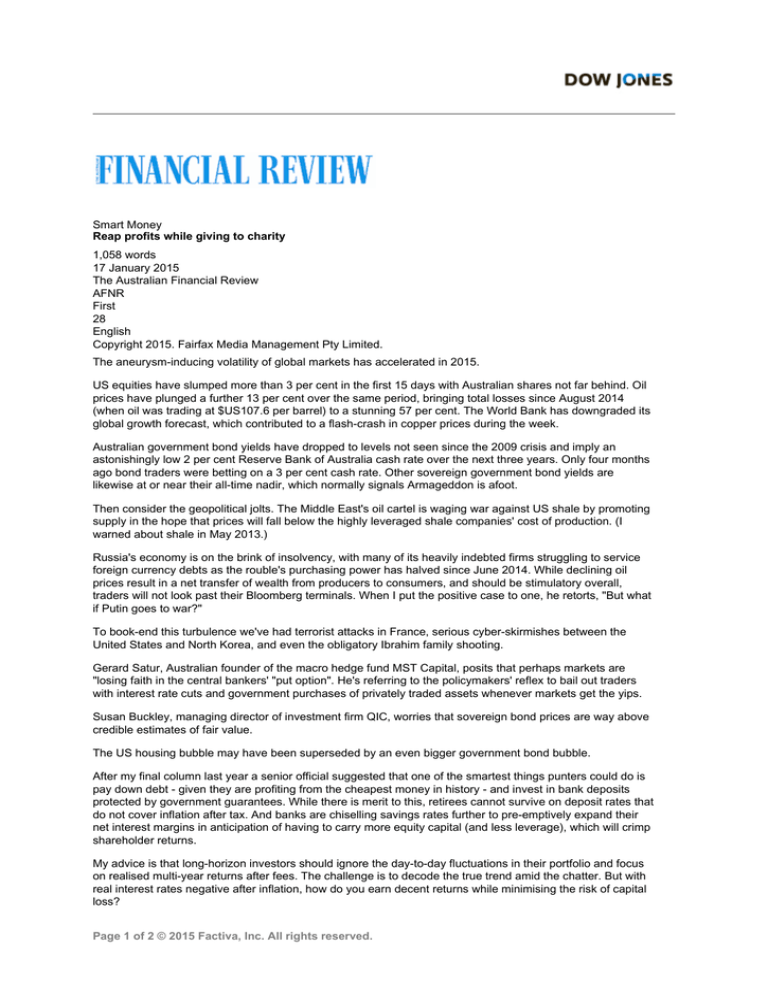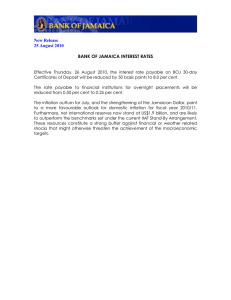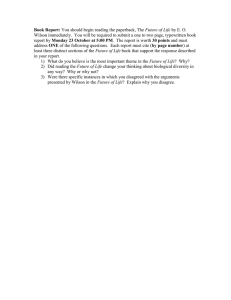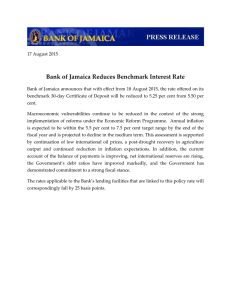
Smart Money
Reap profits while giving to charity
1,058 words
17 January 2015
The Australian Financial Review
AFNR
First
28
English
Copyright 2015. Fairfax Media Management Pty Limited.
The aneurysm-inducing volatility of global markets has accelerated in 2015.
US equities have slumped more than 3 per cent in the first 15 days with Australian shares not far behind. Oil
prices have plunged a further 13 per cent over the same period, bringing total losses since August 2014
(when oil was trading at $US107.6 per barrel) to a stunning 57 per cent. The World Bank has downgraded its
global growth forecast, which contributed to a flash-crash in copper prices during the week.
Australian government bond yields have dropped to levels not seen since the 2009 crisis and imply an
astonishingly low 2 per cent Reserve Bank of Australia cash rate over the next three years. Only four months
ago bond traders were betting on a 3 per cent cash rate. Other sovereign government bond yields are
likewise at or near their all-time nadir, which normally signals Armageddon is afoot.
Then consider the geopolitical jolts. The Middle East's oil cartel is waging war against US shale by promoting
supply in the hope that prices will fall below the highly leveraged shale companies' cost of production. (I
warned about shale in May 2013.)
Russia's economy is on the brink of insolvency, with many of its heavily indebted firms struggling to service
foreign currency debts as the rouble's purchasing power has halved since June 2014. While declining oil
prices result in a net transfer of wealth from producers to consumers, and should be stimulatory overall,
traders will not look past their Bloomberg terminals. When I put the positive case to one, he retorts, "But what
if Putin goes to war?"
To book-end this turbulence we've had terrorist attacks in France, serious cyber-skirmishes between the
United States and North Korea, and even the obligatory Ibrahim family shooting.
Gerard Satur, Australian founder of the macro hedge fund MST Capital, posits that perhaps markets are
"losing faith in the central bankers' "put option". He's referring to the policymakers' reflex to bail out traders
with interest rate cuts and government purchases of privately traded assets whenever markets get the yips.
Susan Buckley, managing director of investment firm QIC, worries that sovereign bond prices are way above
credible estimates of fair value.
The US housing bubble may have been superseded by an even bigger government bond bubble.
After my final column last year a senior official suggested that one of the smartest things punters could do is
pay down debt - given they are profiting from the cheapest money in history - and invest in bank deposits
protected by government guarantees. While there is merit to this, retirees cannot survive on deposit rates that
do not cover inflation after tax. And banks are chiselling savings rates further to pre-emptively expand their
net interest margins in anticipation of having to carry more equity capital (and less leverage), which will crimp
shareholder returns.
My advice is that long-horizon investors should ignore the day-to-day fluctuations in their portfolio and focus
on realised multi-year returns after fees. The challenge is to decode the true trend amid the chatter. But with
real interest rates negative after inflation, how do you earn decent returns while minimising the risk of capital
loss?
Page 1 of 2 © 2015 Factiva, Inc. All rights reserved.
One innovative solution recently launched by Geoff Wilson is the Future Generation Investment Fund. He's
the founder of the listed investment company (LIC) provider, Wilson Asset Management, which runs over
$880 million across three funds.
Wilson says the research shows LICs tend to outperform unlisted managed funds because they are closed
pools of capital. "Money often flows into funds at the top of a market and rushes out at the bottom," he says.
"This compels managers to pick up stocks when they're expensive and sell them when they're cheap. In
contrast, LICs facilitate a longer-term view because you have more committed capital."
After planning to only raise $50 million, Wilson established the oversubscribed Future Generation Investment
Fund in November with $200 million in backing from luminaries such as the Victor Smorgon Group, Solomon
Lew and Andrew Forrest, who invested $10 million each.
And there's nothing quite like it. Future Generation is a listed "fund of funds" that serves two purposes. It
gives access to a well-diversified collection of top equities managers.
"I wanted to pick the best," Wilson says. These include leading long-only and market-neutral funds such as
Regal, Bennelong, Optimal, Cooper, Watermark and Paradice. Some were closed to new investors.
The twist is that these talented investors manage your money for free. In fact, it's better than that. The
average annual management fee and performance fee charged by Future Generation's 15 different funds is
1.3 per cent and 13 per cent, respectively.
Wilson has convinced the managers to gift all these fees, which ordinarily amount to more than 2 per cent
annually, to Future Generation. In return, Future Generation pays 1 per cent of its assets each year (currently
$2 million) to 14 childrens' charities.
If you own more than 1 million shares in Future Generation you get to donate your 1 per cent to any
registered Australian charity. "It's the highest quality funding for charities," Wilson exclaims, "because it's
consistent and does not cost them anything." Wilson says neither he nor his business, which is one of the 15
funds, make any money out of Future Generation.
Any excess manager fees beyond the 1 per cent donations are reflected in the LIC's net asset value and
therefore benefit its investors.
Wilson emphasises that the managers also invest Future Generation's capital in their main funds, not as
separate (and potentially neglected) accounts that could suffer inferior performance.
So Future Generations is a highly efficient, multi-manager equities product that allows you to contribute to
charities while tapping Australia's best fundies for free, including some you would never have access to.
Performance has been consistent with Wilson's aim of "flattening out the equity market's volatility".
"In November when the market fell 3.2 per cent and the Small Ordinaries was off 3.8 per cent, Future
Generation was down only 0.6 per cent," Wilson highlights.
Prospective investors can buy its shares on the exchange or wait for a placement.
Document AFNR000020150116eb1h00048
Search Summary
Text
“Geoff Wilson” OR “Chris Stott” OR “Wilson Asset Management” OR “Martin Hickson”
OR “Matt Haupt” OR “Tobias Yao” OR “Kate Thorley”
Date
In the last week
Source
All Sources
Author
All Authors
Company
All Companies
Subject
All Subjects
Industry
All Industries
Region
Australia
Language
English
Results Found
9
Timestamp
19 January 2015 8:20
Page 2 of 2 © 2015 Factiva, Inc. All rights reserved.



